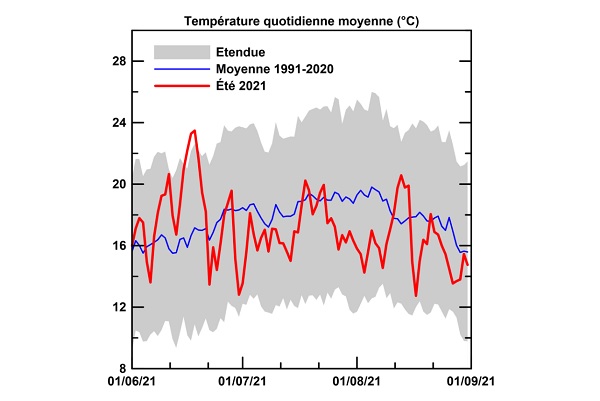 Credit: ASTA
Credit: ASTA
According to the ASTA weather bulletin, a cold summer with record rainfall has delayed the cereal harvest in Luxembourg.
As summer 2021 draws to a close, AgriMeteo, the national meteorological service of the ASTA (Administration des services techniques de l'agriculture) of the Ministry of Agriculture, Viticulture and Rural Development, has published its weather analysis for the period from 1 June to 31 August 2021.
The analysis looked at the network of 32 automatic weather stations across the Grand Duchy. The three-month values of four representative stations, i.e. Asselborn (north), Clemency (south-west), Remich (Mosel) and Grevenmacher (Mosel), were compared with the averages of the reference period 1991-2020.
Overall, the summer of 2021 was slightly colder (-0.5 °C) than recent seasonal averages, with a more marked deviation in the south-west of the country. In terms of rainfall, summer 2021 was the second rainiest since the start of observations in 1854, with a national average precipitation of 336 mm. Only the summer of 1931 was wetter, with an average of 388 mm. In Luxembourg City, a new precipitation record was recorded with 397 mm, whilst in Koerich, Mamer and Wincrange, summer 2021 was the wettest since 1951.
June: hot and stormy
June 2021 was warmer than average overall, with temperature peaks in the second and third week that resulted in localised thunderstorms and occasional excess precipitation.
July: record bad weather and too cold temperatures
July 2021 was marked by below normal temperatures and record precipitation. In fact, this was the wettest July since 1854, with an average surplus of 193 mm. On 14 and 15 July 2021, bad weather caused flooding affecting several localities in Luxembourg. On 14 July, the 32 weather stations recorded between 62.6 mm of rain in Remerschen and a record daily maximum of 105.8 mm in Godbrange.
August: too cold and slightly too dry
Temperatures in August 2021 were generally below seasonal averages. Despite regular rainfall, total precipitation remained slightly below normal across much of the country.
This too cold and too humid seasonal weather has, among other things, delayed the cereal harvest, which remains unfinished, especially in the Oesling region. Moreover, the floods of 14 and 15 July caused significant damage in the agricultural, horticultural and viticultural sector.








